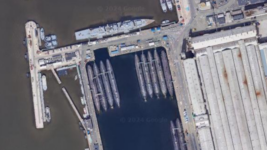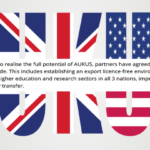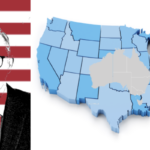Albanese Is Turning Australia into a Nuclear Waste Dump: Interview with Senator Shoebridge

The AUKUS debacle is an issue that never stops giving. And from the time former prime minister Scott Morrison dropped the arrangement on us in September 2021, the agreement between the US, the UK and Australia has had something of the unattainable about it.
Take the central plank of AUKUS stage I, which comprises of eight nuclear-propelled submarines that it’s being conveyed the US and the UK are doing us a favour on, just via the supply of the technology to enable this acquisition.
However, as the months tick by, it’s apparent the nation is paying through the nose.
And revelations last month have thrown the actual supply of the subs that this country is supposed to be acquiring from 2032 onwards into jeopardy, as in order for this to happen, the US needs to increase its production of Virginia submarines, so we can get its leftovers. But it’s running behind.
Indeed, Greens Senator David Shoebridge further pointed out, that the US legislation that facilitates AUKUS, which congress passed late last year, contains a number of kill switches, which includes not handing over any submarines if the US can’t keep up with its own demand.
Radioactivating the continent
Shoebridge was recently in Perth for the second day of hearings into the Senate Standing Committee on Foreign Affairs, Defence and Trade inquiry into the Australian Naval Nuclear Power Safety Bill 2023, which was introduced last November.
This legislation sets up a regulatory framework to facilitate this nation’s foray into nuclear-powered submarines, which includes regulations applying to facilities where AUKUS submarines are supposed to be constructed, as well as regulating submarine and material activities.
Now this last aspect, the material activities, refers to the radioactive waste that will be produced by our nation’s AUKUS submarines, and also the refuse produced by the US and UK rotational submarine force that is to be established in Western Australia by 2027.
And this aspect of the AUKUS deal has been fairly peripheral up until now, due to the attention being given to other parts of the alliance. Yet, basically, the US is planning on turning outback Australia into the site of multiple radioactive waste dumps, and the majority of constituents have no idea.
Dystopian to say the least
So, the nation of Australia has already thrown open the flood gates to the US over AUKUS, which has the main aim of establishing this continent as a remote base for the US, where the Pentagon can stage its planned war against China and then still retreat back across the Pacific to the Americas.
The fact of the matter is, with last month’s revelations, the two aspects of AUKUS that currently appear likely to eventuate is the establishment of the US submarine presence in the west of the continent, and the creation of multiple nuclear waste sites on First Nations land.
Sydney Criminal Lawyers spoke to Senator David Shoebridge about the decision the powers that be have made to dump radioactive waste here, Dutton’s recent plan to go nuclear to abate the energy crisis, and whether at this point, there is still a way for our nation to escape the AUKUS project.
On 4 April, you were in Perth for the second day of committee review hearings into the Australian Naval Nuclear Power Safety Bill 2023, which the government says, “establishes a new regulatory framework to promote and regulate” nuclear safety around the AUKUS submarines.
But that sounds a lot less sinister than this legislation actually is. David, can you talk about your overall misgivings about the bill?
This legislation is literally designed to open up all of Australia to high-level radioactive waste produced from not just some potential future Australian submarines, but also the existing waste stream from decommissioned US and UK submarines.
The legislation proposes to empower the defence minister to effectively declare any part of Australia a nuclear waste dump without any consultation with the public and without any consultation with First Nations Traditional Owners.
It’s an obscene overreach and all under the guise of AUKUS, with an Orwellian name about nuclear safety.
So, this could be multiple sites around the country once it is passed?
The government has already indicated that Garden Island, just a few kilometres off Fremantle and Perth, will be a site, and that will potentially also include Henderson, which is on the mainland of WA.
There is also a site to the north of Adelaide, and that’s the initial site that will receive nuclear waste under this proposal.
But the legislation, though, clearly contemplates and empowers the minister to declare an unlimited number of sites for the receipt of high-level nuclear waste that has never before been stored in Australia.
And am I correct in thinking that the United States and the United Kingdom, despite having utilised nuclear military technologies for decades, don’t have permanent sites to dump their own nuclear waste from this, so they might be looking to Australia to deal with this as well?
The United States has a medium-term but no long-term solution for its military nuclear waste. The UK, however, has no solution.
If you go onto Google Maps and you look at the holding pens of decommissioned nuclear submarines in Scotland and England, you can see the better part of twenty rusting hulks jam-packed with tons of weapons-grade uranium.
Remember, the UK commissioned its first nuclear submarine, the HMS Dreadnought, in the early 1960s, and it was decommissioned in the 1980s.
And now, more than four decades after it was decommissioned, they have no solution for its nuclear waste.
The UK has established a committee to review the issue, and they have an ambitious timetable of potentially having a storage solution in the mid-2060s.
So, this is a very real threat to Australia.
What sort of waste are we going to dump in the ground, on behalf of the UK and the US?
This waste is so toxic to human life that it needs to be secured for over 100,000 years. There is no solution that anyone has been able to identify.
Not only does it require extremely deep geologically-stable storage, but it requires communicating the danger of the material in a language that no one speaks or through symbols that are language neutral.
Because we know in 100,000 years from now, people will not speak any recognisable language that we can put a sign up to warn them.
It is incredibly complex, and indeed, some would argue impossible to safely store this material.
The idea that Australia is currently contemplating nuclear waste dumps seems like the nation has been cast back to arguments from the 1980s.
However, Liberal leader Peter Dutton is now flagging establishing nuclear power plants around the country, and some polling suggests that some Australians are keen.
So, why have we got one of the two individuals currently up for leader of the nation at the next election now reverting to a nuclear power solution to the energy crisis, at a time when other viable alternatives wouldn’t bring the same risks?
One of the reasons Peter Dutton is even able to mount the arguments is that Labor has opened the door with the nuclear submarines and opened the door to a nuclear waste stream entering Australia under the guise of AUKUS.
More fundamentally, though, this is the Coalition trying to come up with any reason to delay the urgent roll out of the renewable energy future that Australia needs.
It’s incredibly convenient for the Coalition’s fossil fuel donors to have an argument out there to delay renewable energy and storage projects. And that is what the nuclear strategy is.
No one seriously believes, in a country with such enormous renewable energy potential, that we will produce nuclear power plants decades in the future, that will pump out electricity at five to six times the cost of an equivalent renewable project.
It’s a political wedge and delaying strategy to benefit the fossil fuel industry.
Since Morrison announced AUKUS, there has been a sense of the government imposing the deal on the people.
However, since Albanese co-launched the AUKUS optimal pathway in March last year, there are increasing concerns that Canberra is bending over backwards to facilitate this deal to the point where the nation is relinquishing power.
Indeed, the central plank of the AUKUS deal, the submarines, don’t seem guaranteed anymore.
Can you speak on how the government is handling the AUKUS negotiations?
This has been a disaster for Australia. Australian taxpayers have spent $5 billion to not deliver French submarines.
They’ve delivered $4.6 billion to the United States for its nuclear submarine industrial base, and another $4.6 billion to Rolls Royce in the UK for the UK nuclear submarine industrial base.
And it is incredibly unlikely that Australia will see a submarine from any of that investment.
For the AUKUS submarine project to even start, the US has to radically increase its production of Virginia class submarines from one submarine a year to 2.3 submarines a year.
There is no evidence this is even likely to happen, and unless it does happen, the US will not divert any of its scarce nuclear submarine resources to Australia, and the entire “investment” will have been wasted.
The fact the Albanese government can’t be honest with the Australian people about the extent of the gamble is pretty remarkable.
But one of the reasons they continue on this path of folly is because the Coalition backs it in too.
Therefore, it avoids any serious parliamentary scrutiny. The other aspect of AUKUS, of course, is that for Australia to be seen as a reliable partner for the US, we cannot in any meaningful way separate our foreign policy from US foreign policy.
We need to be seen not just as an effective ally, but effectively as a lapdog that will follow them into any battle they choose.
If you wanted an explanation of why Australia has been so appalling on the question of Palestine, well, that too lies in this extraordinarily dangerous pact we have with the United States called AUKUS.
Senator, currently, we have the Albanese government going full steam ahead on AUKUS, including turning the continent into the site of multiple nuclear waste dumps on First Nation’s land, while the Liberal Nationals concur with all of AUKUS and further, they want to go nuclear.
Looking up ahead, at least the US-UK rotational submarine force in WA, and the nuclear waste dumps this will require, seem to be close to being locked in.
Is there a way out of all this, or are we set to further destroy this continent and the region in aid of AUKUS domination?
The way out of this horrible mess is to break the two party stranglehold in parliament.
Millions of Australians are appalled by the AUKUS proposal, and the hundreds of thousands spent on nuclear submarines that appear to make our region a lot less stable and safe.
Of course, it is not just the nuclear submarines.
It is the billions of dollars Australian taxpayers are paying to create a base for nuclear attack subs at Garden Island off Perth.
It is the expansion of RAAF Base Tindall in the Northern Territory to deploy nuclear-armed B-52 bombers.
It is the thousands of US marines stationed in Darwin.
It is the continuing loss of sovereignty with the US operation of Pine Gap and other secret defence facilities in the country.
The pattern here is one of, whether it is Labor or the Coalition, Australian governments literally surrendering our sovereignty to the United States to become little more than a self-funding US military outpost in the South Pacific.
I doubt that is what the majority of Australians want our future to become.







